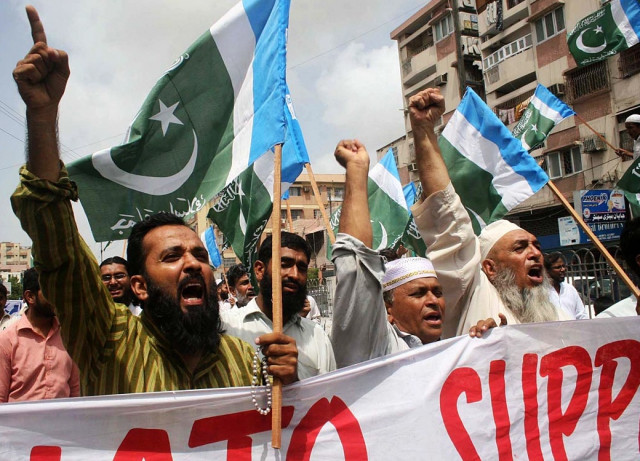The aftermath of Nato supplies resumption
Nato route terrorism in the coming days will decide where Pakistan will land next.

The practical side of this reaction was led by the religious parties, forcing one to think about the cleavage between them and the political parties. On July 6, the Jamaat-e-Islami (JI) and the Jamaatud Dawa (JuD) took out rallies in Karachi, set US flags on fire and proclaimed that political leaders were ‘slaves of the US’. JuD and Muttahida Shehri Mahaz protested in Multan, while JI took out a rally in Rahimyar Khan. In Lahore, Jamiat Ahle Hadith came out on Lawrence Road, its rising star, Allama Ibtisam Ilahi, saying that the rally would move towards Islamabad (sic!) to stop the Nato supplies.
The political parties have been leading the assault on TV channels where TV anchors are painting a sorry picture of ‘proud’ Pakistan having to prostrate itself at the feet of an unjust superpower determined to harm the Muslims of the world. Out of the whole lot seeking to consolidate their vote banks through the Nato supply route, Imran Khan’s Pakistan Tehreek-i-Insaf was most aggressive. But it did not stage any show of real muscle on July 6, which the religious parties had designated as a day of protest. It had once joined the more ‘decisive’ opposition of the Difa-e-Pakistan Council (DPC), but then sought to stand aside after it was accused of taking orders from the ISI.
But if the general perception was correct that the intelligence agencies were behind a predominantly jihadi DPC, the orders were not clear on July 6. The DPC did not come out as aggressively as one had anticipated. It is possible that in the coming days, Nowshehra’s Maulana Samiul Haq will make good his threat of attacking the convoys going to the Khyber Pass, the border post that allows 70 per cent of the Nato supplies to go to Afghanistan. He might ask the DPC to coordinate its protest with the assault the Tehreek-i-Taliban Pakistan (TTP) has pledged in its latest message. Samiul Haq’s madrasa has trained several of the Afghan Taliban and is a power to reckon with inside the terrorist community despite his weak political clout compared with the JuD.
In the coming days, the JuD will face the dilemma of what to make of the signals emanating from Islamabad and Rawalpindi. It came out swinging with both fists when the first signal contrary to what the GHQ and the Foreign Office were trying to do. Hafiz Saeed, his name mud in the international community and lots of dollars riding on his head, must ask himself where he is being led by his masters. He is not Syed Munawwar Hasan seeking a better public profile for his tired little party through the post-Nato route pantomime orchestrated by a semi-literate media. He is powerful, his party capable of fielding an entire army and hurtling it into Afghanistan if the suicidal state of Pakistan wants to once again put its oar into another civil war after the Nato armies exit.
What is off-putting is the spectacle of the parliamentary opposition trying to gain electoral mileage from the Nato route affair. The PML-N has gone back to what it was before it confessed to cussedness and signed the 2006 Charter of Democracy with the PPP in a grand gesture of ‘normalisation’. It has used the judiciary’s spat with the PPP as an instrument of overthrowing the government through street power. The JUI-F’s Maulana Fazlur Rehman has done the same with one eye blinking in the direction of the TTP, but he is always flexible enough to save his party from being damaged through extreme action. Nato route terrorism in the coming days will decide where Pakistan will land next. July 6 was a damp squib.
Published in The Express Tribune, July 8th, 2012.















COMMENTS
Comments are moderated and generally will be posted if they are on-topic and not abusive.
For more information, please see our Comments FAQ